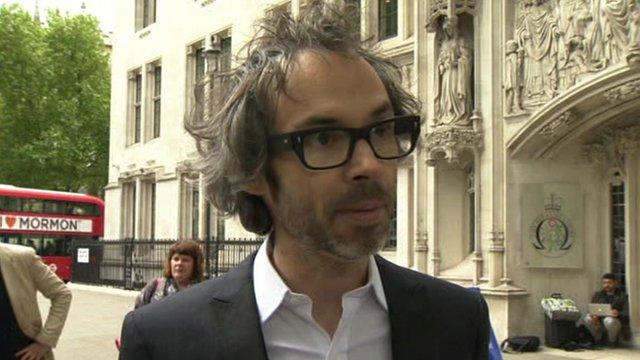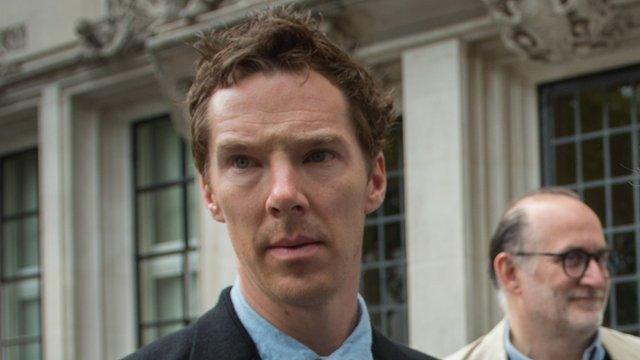Pianist James Rhodes can publish child abuse memoir
- Published
Pianist James Rhodes: "There is no shame in speaking out"
A concert pianist has won a legal battle to publish an autobiographical book giving details of sexual abuse he experienced as a child.
James Rhodes, 40, persuaded Supreme Court justices to lift an injunction that had barred its publication.
The Court of Appeal granted a temporary injunction in October, blocking parts of the memoir, entitled Instrumental.
This was after Mr Rhodes's ex-wife raised fears it would cause their 12-year-old son "serious harm".
Justices had ruled that Mr Rhodes could not be identified, either in media reports or on social media.
Publication 'justified'
Following the injunction, Mr Rhodes asked the Supreme Court for a ruling.
Five Supreme Court justices have now ruled in his favour on Wednesday after examining the case at a January hearing.
Some reporting restrictions have subsequently been lifted.
The justices said Mr Rhodes could be named but the names of his son and ex-wife should not be made public.
The judgement was given jointly by Lady Hale and Lord Toulson, in which they said the "only proper conclusion is that there is every justification for the publication".
They added: "A person who has suffered in the way that the appellant has suffered, and has struggled to cope with the consequences of his suffering in the way that he has struggled, has the right to tell the world about it.
"And there is a corresponding public interest in others being able to listen to his life story in all its searing detail."

Analysis
By Clive Coleman, BBC legal correspondent
Today's ruling turned on a little known case from 1897.
In it, a pub customer played a practical joke on the landlord's wife by telling her that her husband had been seriously injured in an accident.
The joke backfired and the woman suffered and then sued successfully for mental distress.
The case was applied by the Court of Appeal to prevent publication, because it was argued that James Rhodes' son would suffer psychological harm if he read the book, or extracts of it online.
Many were alarmed by the Court of Appeal's use of the ancient case to prevent the book's publication.
A group of famous authors, including Sir Tom Stoppard and Stephen Fry, wrote to the press in protest. Today's judgement is a vindication of the strength of the right to freedom of speech.
"Freedom to report the truth is a basic right to which the law gives a very high level of protection", said Lady Hale and Lord Toulson in their judgement.
It is clear that there is no general law preventing the publication of facts that will distress another person.

'Public interest'
Mr Rhodes' book is now due to be released next week.
It includes accounts of physical and sexual abuse and rape inflicted on him from the age of six by the boxing coach at his school.
It goes on to chart his subsequent abuse of drink and drugs, self-harm, attempts at suicide and time in a psychiatric hospital, culminating in his redemption through music.
Mr Rhodes's alleged abuser was prosecuted but died before he could face trial.
Judges heard that the pianist's son lived with his mother overseas and had disabilities including Asperger's Syndrome and dyspraxia.
His mother said their child was "particularly intelligent" and "very proud" of his father, but did not know about the sexual abuse or the scale of his father's self-harm and mental illness.
It was argued that the boy would become "greatly disturbed" if he became aware of those details.
Hugh Tomlinson QC, representing Mr Rhodes, told the Supreme Court the book was a "true autobiographical account" and there was "a clear public interest in publication".
He also said courts should not become involved "matters of taste" and editorship.
'Freedom of speech'
Speaking outside the court, Mr Rhodes said the ruling was a "victory for freedom of speech".
"If this had been allowed to continue anyone could have used this to ban any book. We do not ban books in this country."
He said the decision also sent a message to children who were victims of abuse.
"I was told not to tell when I was a child. Children are told not to tell. The message is 'tell someone'. This is a victory for victims."
And he said his son would not be harmed by the details published in the book.
Benedict Cumberbatch said it was an ''emotional moment'' after James Rhodes won the right to publish details about sexual abuse he experienced as a child
"I love him more than anything. I am his father," said Mr Rhodes. "He is not going to read the book. This is not a children's book."
Mr Rhodes was joined by actor Benedict Cumberbatch, who said the pair had been friends since school.
Mr Cumberbatch said: "I am here to give my support. It is a very emotional moment... It is a searing vindication of freedom of speech.
"This man suffered abuse when he was a child and was held in silence then, unable to tell a world that turned a blind eye to him during that horrific period of his life.
"And then in adult life, through searing, humbling honesty in a excoriating account of it, in a brilliant, witty, passionate, utterly transparent way in this book, was then trying to express exactly what he'd experienced years later as a adult, was then gagged again.
"To re-experience that veil of silence, that inability to be able to shout for help, is appalling."
- Published20 May 2015

- Published20 May 2015
